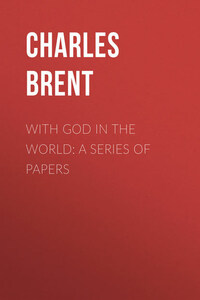Charles Darwin says somewhere that "the only object in writing a book is a proof of earnestness." Whether it is the only object, may be a question; it is certainly one object. And the poorest book that ever went to press, merits respect, provided that its writer is sincere and speaks from conviction. It is this and the sense that "thought is not our own until we impart it" to others, that has encouraged me to write these pages – originally a series of papers prepared for the Saint Andrew's Cross, the organ of a Society for which I am glad to profess publicly a deep admiration and affection. Often, more frequently far than is noted, I have borrowed the thought and language of others to express my own mind. I send out this little volume with the hope that, before it meets with the fate of the ephemeral literature to which it belongs, it may help a few here and there to take up life's journey with steadier steps and cheerier mien.
Chapter I
The Universal Art
It is productive of much mischief to try to make people believe that the life of prayer is easy. In reality there is nothing quite so difficult as strong prayer, nothing so worthy of the attention and the exercise of all the fine parts of a great manhood. On the other hand there is no man who is not equal to the task. So splendid has this human nature of ours become through the Incarnation that it can bear any strain and meet any demand that God sees fit to put upon it. Some duties are individual and special, and there is exemption from them for the many, but there is never any absolution from a duty for which a man has a capacity. There is one universal society, the Church, for which all are eligible and with which all are bound to unite; there is one universal book, the Bible, which all can understand and which it is the duty of all to read; there is one universal art, prayer, in which all may become well skilled and to the acquirement of which all must bend their energies.
Active or dormant, the instinct of prayer abides, a faithful tenant, in every soul. The peasants who went to the Incarnate One and said "Lord, teach us to pray," were representative of a whole race, a race which feels stirring within its breast a capacity for prayer, but whose power to pray falls far short of the desire. The instinct to pray may be undeveloped, or paralyzed by violence, or it may lie bed-ridden in the soul through long neglect; but even so, no benumbed faculty is more readily roused to life and nerved to action than that of prayer. The faculty is there; no one is without it. Whether it expands, and how, is only a question of the will of the person concerned.
It is good to be quite honest and frank. Is it not so that the real thing that makes men dumb towards God is, in the first instance, at any rate, not intellectual doubt about the efficacy of prayer but the difficulty of it all – the rebellion of the flesh, the strain upon the attention, the claim upon the time? Are not the common stumbling-blocks in the way of prayer incidental rather than essential? Do men give up prayer because they are conscientiously convinced that they would do violence to their noble nature if they were to persist in its exercise? Nothing can release a man from the duty of praying but the profound conviction that it would be a sin for him to continue to pray. And it might be safely added that any one thus momentarily caught in the toils of pure reason, any one endowed with such a delicate conscience as would lead to this, must eventually turn again with joy to the neglected task. Even the great agnostic scientist, Tyndall, who, of course, had a very limited view of what prayer was capable of accomplishing, and was in a position to perceive only one dim ray of its beauty – its subjective refining influence upon the petitioner – even such an one declares that "prayer in its purer forms hints at disciplines which few of us can neglect without moral loss."1
How to perfect the talent of prayer – that is the question. Bent upon this errand many wind themselves in the folds of complicated rules or bathe themselves in the vapour of fascinating theories, all to no purpose. Or, as in the case of most things worth coveting, they cast around for some easy way of attainment, only to experience that where they "looked for crowns to fall," they "find the tug's to come, – that's all." Simplicity and courage are two virtues indispensable for those who covet to pray well. Especially must they be ready to embrace difficulty and court pain – and that through the long stretch of a life-time.
Let no man think that sudden in a minute
All is accomplished and the work is done; —
Though with thine earliest dawn thou shouldst begin it
Scarce were it ended in thy setting sun.
Let it be clearly understood at the outset, then, that though the art of prayer is a universal art it is the most difficult of all. But even so this is not an excuse for discouragement or a justification of spiritual indolence, for a man's best desires are always the index and measure of his possibilities; and the most difficult duty that a man is capable of doing is the duty that above all he should do.








